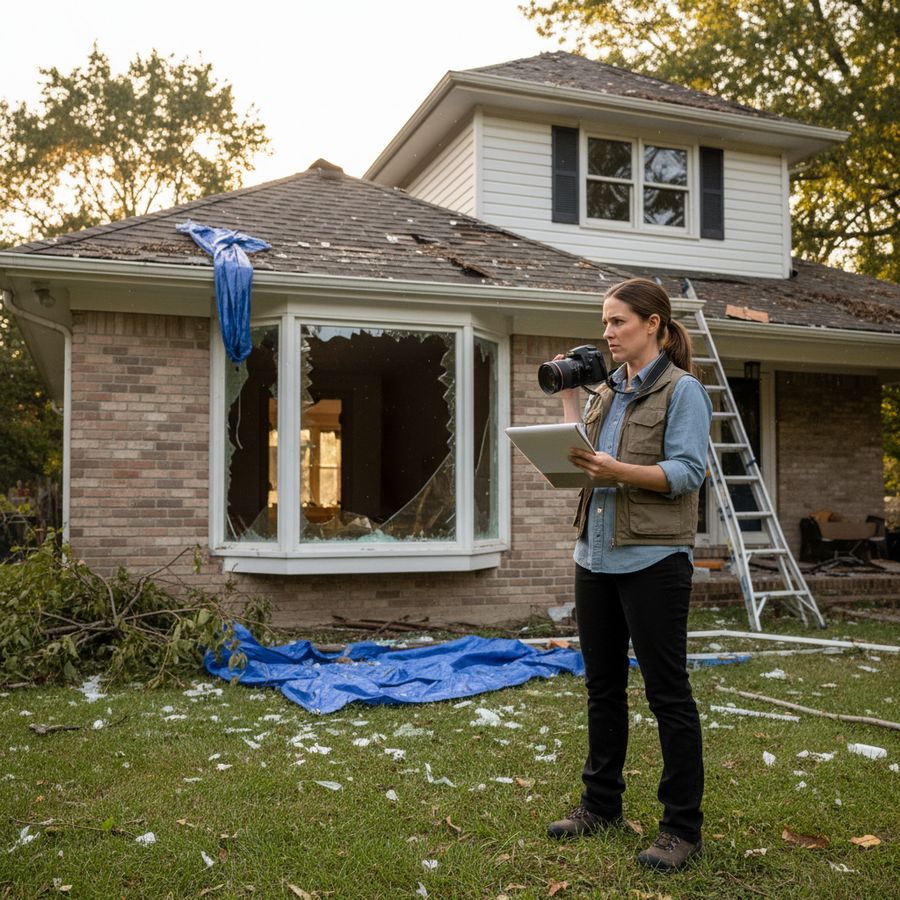Tips for Protecting Your Property From Insurance Fraud
Overview
Property insurance fraud is a serious and growing concern in the insurance industry that affects not only insurance companies but also policyholders. Insurance fraud occurs when individuals or groups intentionally deceive an insurance provider to receive unwarranted benefits or payouts. Protecting your property from insurance fraud is essential to safeguarding your investments, maintaining fair insurance premiums, and ensuring that genuine claims are handled efficiently.
This blog post aims to provide you with valuable tips for recognizing, preventing, and reporting insurance fraud linked to your property. Understanding how fraud schemes work and the legal implications involved can empower you to take proactive measures that protect your assets and reputation.
Insurance fraud prevention starts with awareness and education. By learning the common tactics fraudsters use and knowing how to avoid situations that could trigger suspicion, you can reduce your risk of becoming involved in fraudulent claims—whether knowingly or inadvertently. Moreover, reporting suspected fraud is a civic responsibility that helps keep the insurance market fair and affordable for everyone.
Throughout this article, you will find practical advice and insights categorized under key areas such as what constitutes insurance fraud, common fraud schemes, how to avoid accusations, and the importance of reporting fraud. By following these guidelines, you will be better equipped to protect your property and contribute to fraud mitigation efforts within the insurance ecosystem.
“Insurance fraud is not only illegal but also drives up costs for honest policyholders. Staying vigilant and proactive is the best defense.”

What Constitutes Insurance Fraud
Insurance fraud
Common examples of what constitutes property insurance fraud include:
- Filing false or exaggerated claims about property damage or loss.
- Deliberately causing damage to insured property to collect insurance money.
- Misrepresenting the value or condition of property during the application or claims process.
- Staging accidents or thefts to claim insurance benefits.
- Submitting fraudulent documents such as fake repair invoices or ownership papers.
Even seemingly minor misstatements can be classified as fraud if they are intentional and material to the insurance contract. It is essential to understand that insurance fraud is a criminal offense and may result in severe consequences for those involved.
From a policyholder’s perspective, it’s important to be honest and transparent when dealing with your insurance provider. Any deliberate attempt to deceive could not only lead to claim denial but also legal action. Additionally, insurance companies utilize sophisticated fraud detection systems and investigations to identify suspicious claims, making it harder for fraudulent activities to go unnoticed.
Understanding precisely what constitutes insurance fraud is the first step in protecting yourself and your property from becoming entangled in fraudulent schemes or accusations.
“Intentional deception in property insurance claims undermines trust and leads to harsher penalties and financial losses.”
Common Fraud Schemes
Property insurance fraud can occur in various ways, often involving elaborate schemes designed to exploit insurance policies. Recognizing these common fraud schemes can help you stay vigilant and avoid becoming a victim or an unwitting participant.
Here are some of the prevalent property insurance fraud schemes:
- Exaggerated Claims: Claiming more damage or loss than actually occurred. For example, inflating the value of stolen items or overstating repair costs after property damage.
- Staged Damage or Theft: Intentionally damaging your own property or fabricating a theft to collect insurance money.
- Inflated Repair Bills: Colluding with contractors to submit inflated or fake repair invoices to the insurer.
- Multiple Claims for the Same Damage: Filing multiple claims for the same incident with different insurers or repeatedly claiming the same loss.
- Misrepresenting Property Details: Providing false information about the property’s condition, ownership, or use to obtain better rates or coverage.
- Ghost Brokers: Fraudulent agents selling fake or invalid insurance policies.
These schemes not only jeopardize your insurance coverage but also contribute to increased premiums for all policyholders. Being aware of these tactics allows you to conduct thorough due diligence when selecting contractors, filing claims, or working with insurance agents.
Furthermore, insurance companies have adapted by employing advanced analytics, data mining, and fraud detection technologies to identify suspicious activities early. Thus, engaging honestly and carefully with your insurer will help you avoid unnecessary complications and maintain a trustworthy relationship.
“Fraudulent schemes can be sophisticated, but informed policyholders are the best defense against falling prey to or inadvertently supporting insurance fraud.”

How to Avoid Fraud Accusations
Being wrongly accused of property insurance fraud can be distressing, costly, and damaging to your reputation. Fortunately, there are concrete steps you can take to avoid such accusations and ensure your claims are legitimate and transparent.
First and foremost, always provide accurate and complete information when applying for insurance or filing a claim. Avoid exaggerations, omissions, or misrepresentations, no matter how small they may seem. Insurance companies expect honesty and will verify the details you submit.
Maintain detailed documentation related to your property, including:
- Receipts and appraisals for valuable items.
- Photographs or videos of your property’s condition before and after any incident.
- Copies of contracts and invoices for repairs or maintenance.
- Correspondence with contractors, insurers, or law enforcement.
Clear and organized records can support your claim’s validity and reduce suspicion. When working with contractors or service providers, choose reputable and licensed professionals to avoid fraudulent billing or inflated repair estimates.
Additionally, communicate openly with your insurance adjuster and promptly provide any requested information. Transparency throughout the claims process builds trust and reduces the risk of misunderstandings that could lead to accusations of fraud.
Finally, educate yourself about your insurance policy’s terms and coverage limits. A thorough understanding helps you submit appropriate claims and avoid the appearance of attempting to claim unentitled benefits.
“Honesty, thorough documentation, and clear communication are your best tools to prevent wrongful fraud accusations and to protect your property insurance claim.”
Reporting Suspected Fraud
Insurance fraud is a collective problem that requires vigilance from all stakeholders, including policyholders, insurers, and regulators. If you suspect property insurance fraud—whether involving your claim or someone else’s—it is important to report it promptly and responsibly.
Reporting suspected fraud not only helps protect your interests but also contributes to the larger effort of fraud prevention and fraud reporting within the insurance industry. Early detection and reporting can prevent further losses and assist in the prosecution of fraudulent actors.
To report suspected property insurance fraud, consider the following steps:
- Contact your insurance company: Most insurers have dedicated fraud investigation units or hotlines. Provide them with detailed information and any supporting evidence you may have.
- Notify your state insurance department: Many states have official fraud bureaus or consumer protection divisions that handle insurance fraud complaints.
- Maintain confidentiality: Avoid confronting suspected fraudsters directly. Instead, let the professionals investigate the matter.
- Provide factual information: When reporting, stick to verified facts and observations without speculation or assumptions.
Many insurance companies and regulatory bodies offer anonymous reporting options to protect whistleblowers. Remember, reporting suspected fraud is a responsible act that helps maintain the integrity of the insurance system.
“Your timely fraud reporting can save millions of dollars annually and preserve fair treatment for honest property owners.”
Legal Consequences
Engaging in property insurance fraud carries serious legal consequences that can include criminal charges, civil penalties, and long-term damage to your financial and personal reputation.
Criminal penalties vary by jurisdiction but may include fines, restitution payments, probation, or imprisonment. Convictions for insurance fraud are often considered felonies, which can impact future employment, credit, and insurance eligibility.
In addition to criminal charges, insurers may pursue civil actions to recover fraudulently paid claims. This can result in substantial financial liabilities, including the repayment of benefits, punitive damages, and legal fees.
Even if accusations are unfounded, the legal process can be time-consuming and stressful. This underscores the importance of adhering strictly to legal and ethical standards when dealing with property insurance.
Insurance fraud detection methods have become increasingly sophisticated, making it difficult to successfully perpetrate fraud without detection and prosecution. The financial and reputational risks far outweigh any perceived short-term benefits.
“The consequences of property insurance fraud extend well beyond financial penalties—they can affect your future opportunities and peace of mind.”
Conclusion
Protecting your property from insurance fraud requires a combination of awareness, honesty, and proactive action. By understanding what constitutes insurance fraud and recognizing common fraud schemes, you can avoid behaviors that might inadvertently lead to accusations or claims denial.
Insurance fraud prevention starts with transparency—providing accurate information, maintaining thorough documentation, and choosing reputable service providers. In addition, being prepared to report suspected fraud supports the integrity of the insurance system and benefits all policyholders.
Remember that legal consequences for insurance fraud are severe, emphasizing the importance of ethical conduct in all dealings with your property insurance. By following the tips and best practices discussed here, you can safeguard your property, maintain your insurance coverage, and contribute to reducing fraud in the industry.
Stay informed, stay honest, and stay vigilant—these are your best defenses against property insurance fraud.
Reacties
Een reactie posten